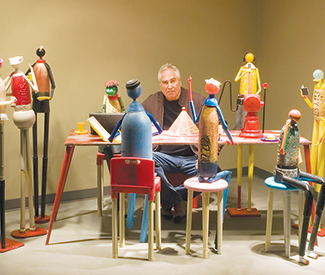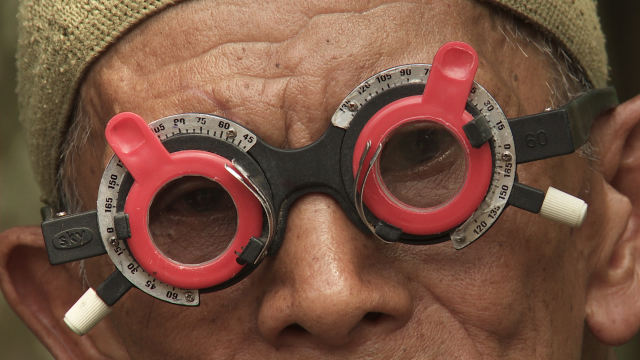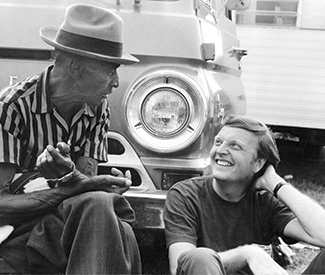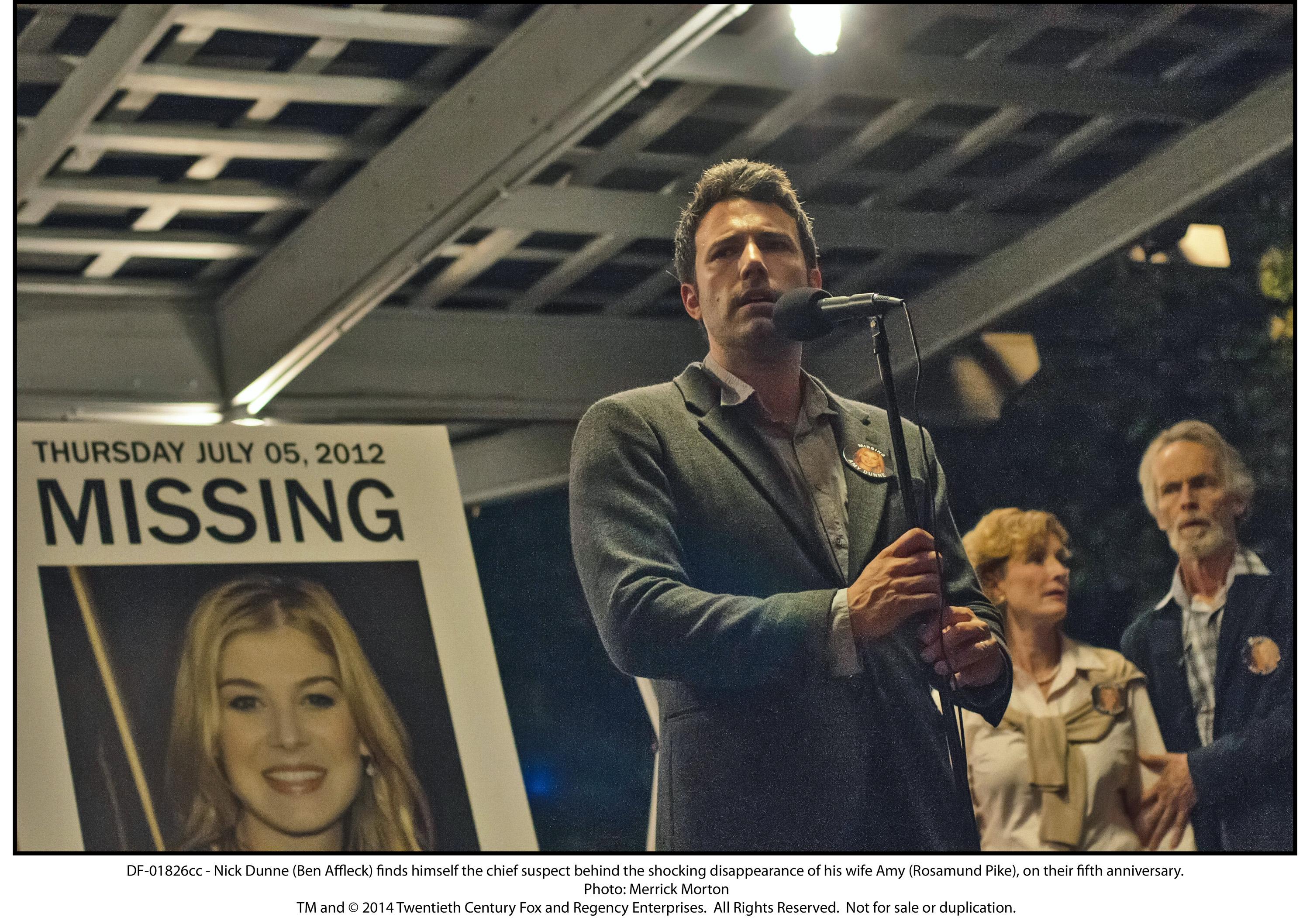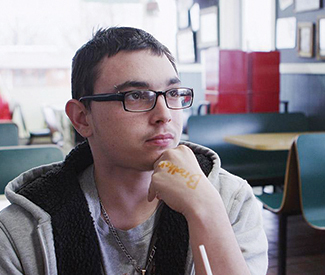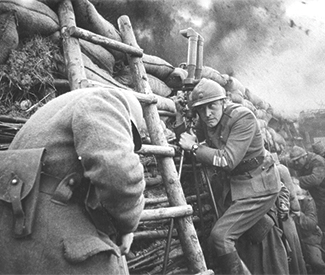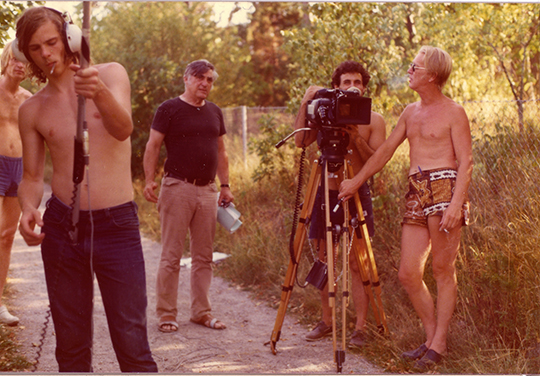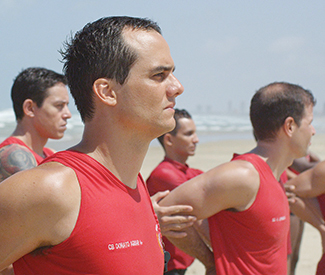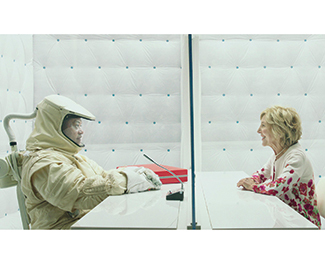Film listings are edited by Cheryl Eddy. Reviewers are Kimberly Chun, Dennis Harvey, Lynn Rapoport, and Sara Maria Vizcarrondo. For rep house showtimes, see Rep Clock.
OPENING
As Above, So Below Psychological and supernatural terror overtakes a group of explorers (including Mad Men‘s Ben Feldman) who venture off the map in Paris’ catacombs. (1:40) California.
Brasslands Horn dogs, rejoice! Brassy, flashy joy mixed with a history of pain and a heaping helping of trumpets, tubas, and all manner of ex-band geeks mark this documentary on Serbia’s Guca Trumpet Festival. NYC’s Meerkat Media Collective captures all the delightful noise as more than half a million music fans converge on the valley hamlet of Guca for the annual competition, which promises fame and fortune for its winners. In honor of the 50th anniversary, a decade after NATO finally unleashed its fury on Belgrade, international combos have returned to an old country still roiling with issues, from a native Serbian band of champions whose leader promises to wipe the Roma combos “off the face of the earth,” to the groom at a wedding party who “wants to fire a gun but is afraid he’ll look like a terrorist on film,” to the Roma player who shrugs, “We’re ‘black’ musicians — they’re ‘white’ musicians.” Not to mention Zlatne Uste, the brass band of New Yorkers, said to be the first non-Serbian outfit to play the festival, who honestly own up to their outsider status and the band-camp bubble they foster. “People don’t like Americans there in general, not to mention leftie, hippie, weird Americans who have appropriated all their national music to provide this fantasy world that we live in here,” says one female band member, an anomaly in a still-male-dominated scene. Far be it from the filmmakers to shy from the heat, whether it’s a particularly incendiary quote, the bloody slaughter of a lamb at a Roma celebration, or an especially hot horn solo. (1:24) Roxie. (Chun)
Jamie Marks Is Dead When the titular bullied teen (Noah Silver) is found dead — whether by suicide or foul play is unclear — those most affected turn out to be two schoolmates who were barely aware of him, or each other, while he was alive. Gracie (Morgan Saylor) discovered the corpse under a river bridge on the fringe of their small upstate NY town; track star Adam (Cameron Monaghan) witnessed teammates cruelly abusing the misfit boy but did nothing to stop it. When the two cross paths, Gracie reveals that she’s seen Jamie — pale, naked, shivering, as if stuck in his last moments of life — lurking in the woods outside her home. Frightened, she urges Adam not to engage with the ghost. But in his guilt, he does, striking up a curious friendship with this specter who’s “come back” for purposes murky at best. Adapted from a novel by Christopher Barzak, this couldn’t be more different from director Carter Smith’s 2008 gore-horror hit The Ruins, being cryptic supernatural drama that aims less for scares than eerie poignancy. (The one scary element is Madisen Beaty as a malevolent second ghost.) It’s eerie, all right, with wintry atmospherics that intrigue until it’s clear the story is going to remain rather vague. The poignancy never quite comes across (save perhaps in a subplot with Liv Tyler as Adam’s mother, who copes haplessly with a serious accident) because while well-acted, the characters are poorly developed, and the precise point remains elusive. This is an aesthetically striking mood piece, but will frustrate those looking for conventional horror content, and it’s never quite enigmatically fascinating enough to leap past various potholes of conceptual and plot logic. (1:40) (Harvey)
Kundo: Age of the Rampant Brutal violence and some mightily clever outlaw fighting tactics highlight this spaghetti western-influenced revenge drama, set during Korea’s Joseon dynasty, circa the late 1850s. Corruption reigns, with government officials easily bought by the era’s version of one-percenters — leaving the majority of the population to struggle and starve. A long, complicated back story unites the two leads, one being Jo Yoon (Kang Dong-won), the power-mad, illegitimate son of the countryside’s richest man, who channels his Game of Thrones-style angst about being a bastard into becoming the deadliest sword-wielder around. The other is Dolmuchi (Ha Jung-woo), a dirt-poor butcher who backs out of one of Jo’s cruel schemes, sees his family slaughtered, and is quickly adopted by the region’s scrappy, ruthless, Robin Hood-esque bandit clan. These two angry mofos are set up early for a last-act clash, but director Yoon Jong-bin — helmer of excellent 2012 crime drama Nameless Gangster, a similarly intricate tale of simmering grudges and vulgar displays of power in 1980s Busan — takes the long road getting to the inevitable showdown, raising the stakes ever higher, fleshing out secondary characters, and papering over story gaps with narration when needed. Still, with its charismatic performances and Morricone-esque score, this is a rousing epic, and taken with Gangster (which also stars Ha), it firmly establishes Yoon as a director worthy of further notice. (1:40) Four Star. (Eddy)
Life of Crime Maintaining the novel’s original time and place, this retro caper flick is a faithful adaptation of Elmore Leonard’s jaunty 1978 The Switch. John Hawkes and Yasiin Bey (aka Mos Def) play genial petty criminals who hit on the bright idea of blackmailing a successful suburban Detroit businessman (Tim Robbins) they know has secretly pocketed away some ill-gained assets in the Bahamas — and they’ll kidnap his wife (Jennifer Aniston) for additional leverage. Little do they realize their spectacularly scumbaggy target sees a golden opportunity in their idle threats to murder Mrs. Scumbag; he’s tired of her, he’s already got a younger mistress (Isla Fisher), and figures this scenario would relieve him of alimony at the very least. With Mark Boone Jr. and Will Forte providing additional flavor as two more colorfully icky characters, Life of Crime is droll, astute, and funny as it cleverly delivers comeuppance where due. While much less flashy or sprawly than last year’s American Hustle, Daniel Schecter’s trades in equally tacky late-1970s fashions and vibes. It’s also, in its more modest way, just as satisfying a narrative. And in a movie full of good actors, the surprisingly scene-stealingest is Aniston, who underplays her unhappy trophy hausfrau to seriocomic perfection. (1:34) (Harvey)
Love is Strange Ben (John Lithgow) and George (Alfred Molina) have been together four decades, so it’s a big celebration for their extended family of friends and relations when they finally, legally get hitched. But news of the marriage reaches the archdiocese in charge of the Catholic high school where George teaches music, and while he’s hardly been in the closet at work or anywhere else, this supposed gesture of public defiance against church doctrine gets the beloved instructor fired. With Ben a not-particularly-successful painter, and George now looking for a new job, the couple can now no longer afford to pay the mortgage on the Manhattan co-op apartment they’ve lived in for 20 years (but only owned for five). Finding an affordable new place is near-impossible. So the pair find themselves split up, forced to crash under different roofs and awkward circumstances. Ben moves in with his workaholic nephew (Darren Burrows), unwittingly heightening tensions with his author wife (Marisa Tomei) and especially their moody teenage son (Charlie Tahan), who deeply resents having to share his bedroom. George lands on the couch of a younger gay couple, two cops (Cheyenne Jackson, Manny Perez) who are very nice but have an active social life that robs him of privacy and sleep. This latest from ever-more-excellent Ira Sachs (2012’s Keep the Lights On), its near-flawless screenplay co-written with Mauricio Zacharias, is a widely relatable drama about precisely observed human nature and increasingly inhumane economic realities. It’s also easily one of the best US films 2014 is likely to offer. Might as well start filling out your Oscar ballots, because this movie is definitely going to be a contender. (1:38) Embarcadero, Shattuck. (Harvey)
November Man Pierce Brosnan, who knows a thing or two about being a secret agent, stars as an ex-CIA operative lured out of retirement for one last mission. (1:48)
Road to Ninja: Naruto the Movie Masashi Kishimoto’s manga series goes cinematic for the ninth time in this 2012 release, which is “set in an alternate timeline of the Naruto universe.” (1:50)
A Summer’s Tale This 1996 entry in Eric Rohmer’s “Tales of the Four Seasons” quartet somehow never got a US theatrical release until now. Killing time in a seaside resort town before starting his first post-university engineering job — though his real love is composing songs — Gaspard (Melvil Poupaud) pines for a girl he barely met before she left without giving him her contact info. He’s befriended by Margot (Amanda Langlet), an ethnomusicologist working the summer at an aunt’s restaurant, but despite her amiability (and availability) he clings to hopes that the elusive Lena will turn up. Nonetheless, he lets himself get sidetracked by aggressive Solene (Gwenaelle Simon), whose entire family seems to be musical. His indecision, and the exasperatingly changeable desires of these young women, make for too many options that are sure to cancel each other out. Rohmer’s typically low-key near-farce of romantic dead ends is a pleasant discovery for fans, but as hapless Gaspard’s travails ramble on toward two hours, it becomes one of this late French great’s lesser works. (1:54) Opera Plaza, Shattuck. (Harvey)
The Trip to Italy Steve Coogan and Rob Brydon return as “Steve Coogan” and “Rob Brydon” in this sequel to Michael Winterbottom’s 2010 The Trip. Like its predecessor, the premise — a road trip for the purpose of a restaurant-reviewing gig — provides a loose framework upon which these two actor-comedians, portraying exaggerated, fictionalized versions of themselves, hang their easy banter and occasional deeper conversations. The midlife crisis themes are still apparent (Brydon meets a comely expat who tempts him into cheating on his wife, with whom he has a small child; Coogan feels regret over his distant relationship with his teenage son), which tie into career anxieties for both men; references to classic literature also hold over from the first film. Most importantly, also like the first film, The Trip to Italy — blessed with all the gorgeous food and coastal landscapes the change of scenery suggests — is a riot. The impressions (lots of Godfather this time around) flow fast and furiously; while there’s nothing that can top the first film’s Michael Caine battle, it’s still a pleasure watching Brydon “converse” with a historical relic at Pompeii, or the duo’s joyous invocation of The Bounty (1984) during a brief boat journey. (1:55) Albany, Embarcadero, Smith Rafael. (Eddy)
ONGOING
Begin Again Begin Again does indeed resemble writer-director John Carney’s Once (2007): It’s another musical tale of a romantically-challenged artist whose life is changed by a chance encounter. One miserable night, very recent dump-ee Greta (Keira Knightley) takes the stage at an open mic night, crooning a song she’s just written about jumping in front of a subway train. (Knightley does her own singing, but careful camerawork ensures we never get a good look at her guitar skills.) Dan (Mark Ruffalo), a down-on-his-luck music-biz professional whose career status is nearly as dismal as his personal life, is drunkenly enthralled by her performance. Clearly, there’s nothing for these two depressed souls to do but record an album together on the streets of NYC; for her, it’s a way to get even with her cheatin’ ex (Adam Levine, playing a rock star not unlike … Adam Levine); for him, it offers hope for creative rebirth. Carney’s point of view is abundantly clear: tailoring one’s music to please the basic-bitch demographic is bad; while penning personally meaningful tunes and recording them on one’s own terms is good … even if those tunes happen to be forgettable folk-pop. Fortunately, Begin Again fares better with its explorations of complicated relationships. Nobody does rumpled and wounded better than Ruffalo, and Knightley is surprisingly likable as a hipster scorned, determined to figure out her next move even as her world crumbles around her. (1:45) Shattuck, Vogue. (Eddy)
Boyhood Believe the hype: Richard Linklater’s Boyhood is one of the best films of the year. It’d be a towering cinematic accomplishment in any year. By now, you’ve heard the set-up, which borrows elements from Linklater’s Before films, as well as his coming-of-age dramas (1993’s Dazed and Confused in particular). He filmed his cast — including titular youth Ellar Coltrane, Lorelai Linklater as his older sister, and Patricia Arquette and Ethan Hawke as his divorced parents, on and off over 12 years — with scenes touching on moments both monumental (high-tension moments with ugly stepfathers) and microscopic (the creation of a perfect campfire s’more). The years flow by, signaled not by any obvious gestures like on-screen text, but by changing hairstyles, pop culture references, and evolving video-game consoles. Watching Coltrane’s Mason grow from arrowhead-obsessed tyke to thoughtful college freshman is a rare and remarkable pleasure; among the more experienced actors, Arquette is particularly moving as a fiercely loving single mom determined to advance in her career despite continual, mountain-sized roadblocks in her personal life. (2:40) Balboa, California, Embarcadero, 1000 Van Ness, Piedmont, Presidio, Sundance Kabuki. (Eddy)
Calvary John Michael McDonagh made a splashy cinematic entree both writing and directing 2011’s acerbic The Guard, which starred Brendan Gleeson as a willfully perverse small-town cop. Filmmaker and actor are back with Calvary, a film just as good, in which Gleeson’s priest is the discreetly gruff moral center of a coastal Irish hamlet that surely would have none otherwise. His parishioners are all skeptics, heretics, nonbelievers, and blatant sinners — cast members include Chris O’Dowd, Aidan Gillen, and Brendan’s real-life son Domnhall — who take particular pleasure in ridiculing the uprightness of this one man no one has a legitimate gripe against, save resentment. As if all this weren’t enough, at Calvary‘s start, an unseen confessor tells James he was abused for years by a (now-dead) Catholic priest, and as recompense will kill his current, admittedly blameless confessor in a week’s time. This set-up would appear entirely, absurdly skewed if not for the gravitational center Gleeson provides; he single-handedly provides the sincere if faint hope of redemption in a scenario that otherwise provides every possible indication of damnation for all. Calvary centrally addresses the question of faith while ultimately dodging the answer. I’d appreciate McDonagh’s ambivalence more if he weren’t quite so pleased about it. He’s got extraordinary taste, no doubt — from its editorial pace to its costume and soundtrack choices, this movie is curated within an inch of too-much-ness. But beyond his understandable disillusionment with the Catholic Church’s crimes, does he truly care about morality, or is it just an authorial chew-toy? (1:45) Piedmont, SF Centre, Shattuck, Sundance Kabuki. (Harvey)
Chef Not to take anything away from the superhero crew, but Chef feels like the closest thing to a labor of love from writer, director, and star Jon Favreau in many a day. As a director, he may have been making doughnuts — fun-filled and teeming with CGI eye candy, but doughnuts nevertheless — when it came to effects-driven blockbusters like 2008’s Iron Man, but this well-meaning play for the heart, by way of the stomach, shows you where Favreau’s head is really at. Chef revolves around Carl Casper (Favreau), a onetime food star, now reduced to serving up predictable crowd-pleasers at the behest of his restaurant’s overbearing owner (Dustin Huffman). It takes the barbs of an influential critic (Oliver Platt) — and an ensuing Twitter war — to set Carl off and send him away on his own, at the coaxing of his glam ex Inez (Sofia Vergara). Hooked up with a dilapidated food truck and former kitchen staffer Martin (John Leguizamo), and aided by ably Tweeting son Percy (Emjay Anthony), Carl ties his dreams — and lost passion — to the classic Cuban sandwich. The ensuing road trip from Miami to LA, and Carl’s journey toward self and a renewed relationship with his son, is a fun (if, in the end, a bit too speedily sketched) vault through the joys of eating your way through America’s new culinary heartland. Amid the volley of sign-of-the-times social-media swinging and cameos by the uncostumed Robert Downey Jr., Scarlett Johansson, and the like, Favreau’s main dish is that a family that eats, cooks, and runs a business together, stays together — child labor laws or no. (1:55) Marina, SF Centre, Vogue. (Chun)
Le Chef Before you fire up Twitter to alert Jon Favreau that he’s been ripped off, know that this French comedy came out in 2012. Also, it’s highly unlikely to garner even a quarter-teaspoon of the praise racked up by Favreau’s food-truck tale. Even the formidable presence of Jean Reno can’t save Le Chef; he plays veteran celebrity chef Lagarde, who’s about to have his professional reputation toppled by the money-hungry mogul who owns his signature restaurant. (Yuppie scum wants him to switch to uber-trendy molecular cuisine; traditionalist Legarde ain’t having it.) Enter eager apprentice Jacky (Michael Youn), whose Rain Man-like ability to recall all of Legarde’s recipes makes him a valuable secret weapon in this high-stakes gastronomical battle, which will culminate when a food critic decides whether to dock one of the stars in Legarde’s rating — thus opening a contract loophole that’ll allow his boss to kick him out of the kitchen. BYO food clichés to describe this too-lightweight yet overly hammy affair, which also folds domestic dramas (Jacky’s exasperated, heavily pregnant GF doesn’t understand his cooking dreams! Legarde’s neglected daughter might as well be named Sullen McEyeroll!) into the batter. And if you can’t figure out the ending within the first act, no dessert for you. (1:24) Opera Plaza. (Eddy)
Dawn of the Planet of the Apes As usual, a heady hybrid of anticipation and dread accompanies all Planet of Apes installments: you brace yourself for the abused, righteously rebellious apes; the apocalyptic mise-en-scène laden with symbolism; and more overt messaging concerning animal testing, civil rights, and gun control. But why worry? In line with 2011’s Rise of the Planet of the Apes, the PG-13 high-fives go to new Apes director Matt Reeves (2008’s Cloverfield) for sparing us animal kills, gore, and graphic violence, despite its Dawn of the Dead-evoking title. Really, this Dawn is all about the bitterly fought beginnings of a civilization among the primates north of the Golden Gate Bridge in Muir Woods, complete with community building, social structure, and alas, a burgeoning war with the humanoids amid vaguely familiar SF ruins, setting off an epic showdown that challenges not only the oft-repeated commandment “ape shall not kill ape” but takes advantage of our anthropomorphized pals’ ability to swing with the C4 explosions. The viral drug ALZ 113 that led to super-intelligent primates like chimp hero Caesar (motion-captured Andy Serkis) has decimated the human population, leaving the field wide open for enterprising and vengeful creatures like scarred lab survivor Koba (motion-captured Toby Kebbell). Neither quite trusts the band of desperate human survivors — including friendly Jason Clarke, nurturing Keri Russell, and token asshole Kirk Acevedo — that ventures into the apes’ woods to harness the power of nature, namely a dam, to electrify their SF compound. You know what side of the evolutionary span we’re on when the humans seem much more interchangeable than the chimps, and the movie can barely wait to end on its contemporary version of a Touch of Evil (1958) crane shot, as it zooms to an extreme close-up of a certain chimp’s carefully crafted eyes. (2:10) Metreon, 1000 Van Ness. (Chun)
The Expendables 3 Patrick Hughes — the guy tapped to helm the remake of 2011’s The Raid — directs a cast of thousands (more or less) in this third installment of Sylvester Stallone’s retro action franchise. By now, the Expendables movies have their formula down, not that it was particularly original to begin with, and all the marks are duly hit in part three: sinister bad guy (Mel Gibson — a solid choice, since who doesn’t love to hate him?) angers mercenary Barney (Stallone) and his team of graying, gun-wielding, shit-talking badasses (Jason Statham, Dolph Lundgren, Randy Couture, and Terry Crews). Revenge is sought, bullets fly, buildings explode, a government operative sticks his nose in (here, it’s Harrison Ford), and Arnold Schwarzenegger shows up to save the day. Fortunately, Expendables business as usual also happens to be stupidly enjoyable, especially with the addition of a just-out-of-prison (onscreen and off) Wesley Snipes. There are also fun roles for Antonio Banderas, Kelsey Grammar, and Robert Davi, but the crew’s next-generation recruits (rebel Kellen Lutz, hacker Glen Powell, weapons master Victor Ortiz, and ladybro Ronda Rousey) seem rather unnecessary. Isn’t the point of these movies to remind us that old guys still rule? (2:07) Metreon, 1000 Van Ness. (Eddy)
A Five Star Life Does the world need a Euro-femme counterpart to 2009’s Up in the Air? This warm look at a so-called “mystery guest”-cum-hotel inspector, who spends more time working in transit than in her own home (where she’d be in danger of allowing her personal life to unfold), doesn’t have quite the same torn-from-the-headlines, corporate-hatchet-man edge. Nevertheless, A Five Star Life‘s subject — centered on a 40-ish single career-woman, still such a demographic rarity these days for films — is subtly subversive, in a molto well-heeled way, while offering guilty pleasure peeps at posh concierge services and scented beige corridors. Irene (Margherita Buy) is a workaholic, but can you blame her when her job is critiquing luxe lodgings around the world? The downside of such a passion for order and perfection is that she has no one to otherwise share her high-thread-count linens. A chance encounter turns this professional traveler around and leads her question everything, though mercifully director Maria Sole Tognazzi doesn’t end up reaching for easy, Eat, Pray, Love-style responses. Self-love or acceptance, it seems, is the answer. (1:25) Opera Plaza. (Chun)
Frank Who doesn’t want to be a musical savant, visually riveting, naturally gifted, freed from convention, and liberated of linear thought? The exception might be the doll-headed, damaged namesake of this comedy loosely inspired by the life of late English musician and comedian Frank Sidebottom (real name: Chris Sievey), and real-life Sidebottom sideguy Jon Ronson, who co-wrote the screenplay. And if this loving, very funny, bromantic take on the so-called creative process of rock seems a bit forced at times, that’s only because the movie is so clearly filtered through the archetypal wannabe, made likable by Domhnall Gleeson. His office worker Jon is struggling to write songs when he stumbles across a band, Soronprfbs, after watching their keyboard player attempt to drown himself at the beach. Manager Don (Scoot McNairy) taps the bystander to contribute to the chaos happening onstage, then drags him off for the making of the album. Mysterious leader Frank (Michael Fassbender), who never takes off his massive, faux-happy head, finds inspiration in threads protruding from upholstery. As Jon’s nest egg gets sucked into the recording budget and theremin player Clara (Maggie Gyllenhaal) rages against the interloper, he posts the band’s, er, artistry to YouTube, obtaining the group a coveted gig at South by Southwest. But who really wants this shot at fame? The sideman with a will to power, or the damaged true talent? Director Lenny Abrahamson and Ronson wisely place Frank squarely in the viral video/GIF/Vine-poisoned multiplatform miasma of today, put across all the more powerfully by Gleeson and particularly Fassbender, who reveals a fine singing voice. While cleverly referencing outsider artists big and small by way of right-on original songs by Stephen Rennicks, Frank asks vital questions about motivation and art-making in an era when it seems like everyone is getting their 15 minutes of fame — and we’re getting increasingly weary of eyeballing it and filtering the wheat from the gone-in-a-nanosecond chaff. Some make music because they want to be stars, while others, Frank says, do it because they have little other choice. (1:34) Embarcadero, Shattuck, Smith Rafael. (Chun)
Get On Up Say it loud: you want to get on up on this biopic about the rich, complicated life of James Brown, a musical innovator who straddled the worlds of R&B, soul, rock ‘n’ roll, funk, hip-hop, and beyond. At first glance it seems well furnished, with a cast that includes Chadwick Boseman (last year’s 42), True Blood‘s Nelsan Ellis, The Walking Dead‘s Lennie James, Dan Aykroyd, and turns by Viola Davis and Octavia Spencer (last united in director Tate Taylor’s 2011 The Help). There’s also a slew of musician cameos (Jill Scott, Aloe Blacc), and even some personally invested oversight by co-producer Mick Jagger — not to mention the music and some vividly recreated live performances that impart some of the Godfather of Soul’s undeniable power and influence. Taylor strives to get it all in, including Brown’s childhood years of poverty and hustle; his meeting with longtime friend and collaborator Bobby Byrd (Ellis); his struggles with the law as well as disgruntled Famous Flames and band members like Maceo Parker (Craig Robinson); and his political statements, wife beating, gun toting, coke smoking, and generally exploding ego. If fitting all that into a little over two hours sounds like a task that would make a ex-Flame break a sweat, it is. And it feels even more effortful when Taylor mixes in scrambled chronology and erratic instances when Boseman’s Brown breaks the fourth wall (engaging moments that contrast with the lead’s at times glazed-eye, ungrounded readings). After taking in this flow-killing editing mishmash, you wish Taylor had settled into the groove of a straightforward narrative, à la 2004’s Ray, rather than leaping around as if directing a nouvelle vague effort on PCP. Lord knows the man’s life — not to mention the tempestuous bromance between Brown and Byrd — was fascinating enough to carry us through. Instead, we’re reduced to contemplating the blank looks and bad wigs that turn the “It’s a Man’s Man’s Man’s World” performer into a kind of Golden Girl of Funk. (2:18) SF Centre, Shattuck. (Chun)
The Giver Lois Lowry’s classic YA novel gets a veteran helmer for its big-screen adaptation, but Philip Noyce’s ability to attract top adult talent (Meryl Streep, Jeff Bridges) can’t outweigh his heavy-handed interpretation of what was never a subtle work to begin with. In a vaguely post-apocalyptic society so regulated and dulled that nobody has emotions or empathy, a young man named Jonas (Maleficent‘s Brenton Thwaites, bumped up in age from the book’s 11-year-old) is tasked with becoming the “receiver of memories.” Basically this means that he gets to hang out with Bridges’ character and learn things about the world and human history in the form of Koyaanisqatsi-meets-National Geographic montages (music — it’s a thing! Also: war is hell, etc.) This is life-changing stuff, but part of the deal is that he must never, ever tell anyone else about it, at least until he’s as grizzled as Bridges and has his own successor in need of a thorough mind-blowing. Of course, he immediately loops in pretty BFF Fiona (Odeya Rush), who he’s been seeing in a new light since catching wind of a concept called “love.” Soon, his awakening draws the ire of his mother-esque guardian (Katie Holmes), as well as the community’s leader (Streep). If you’re looking for suspense, or any curve balls (duuuude … once Jonas’ mind starts expanding, he starts seeing the black-and-white world in color!), best backtrack to one of Noyce’s 1990s thrillers (1992’s Patriot Games, perhaps). About the only surprise in The Giver is that Taylor Swift’s much-hyped role is smaller than expected, and not nearly as distracting. (1:40) Marina, 1000 Van Ness, SF Centre, Sundance Kabuki. (Eddy)
Guardians of the Galaxy The trailer that nearly broke the internet didn’t lie: Guardians of the Galaxy is cheeky, hilarious, eye-popping fun. Its plot may be a predictable anti-hero’s journey, but the saga of Peter “Star-Lord” Quill (Chris Pratt), half-Earthling, half maybe-alien, as he transforms from scavenging scoundrel to rescuer-of-the-universe is so enjoyable nobody seeking a good time at the movies will care. Helping Quill in his battle against baddie Ronan (Lee Pace) are slinky, green-skinned Gamora (Zoe Saldana); rascally raccoon Rocket (voiced by Bradley Cooper); muscle-bound dim bulb Drax (former pro wrestler Dave Bautista); and a tree-like creature named Groot (voiced by Vin Diesel — his best performance in years, if ever, despite the fact that the only words the character ever utters are “I am Groot.”) Director and co-writer James Gunn (2010’s Super), working from a cult comic from the prolific house of Marvel, does a stellar job balancing action and goofiness, with plenty of unexpected touches along the way, including the best use of 1970s soft-rock since Reservoir Dogs (1992) and Cherish (2002). (2:02) Balboa, Metreon, 1000 Van Ness, Presidio, Sundance Kabuki. (Eddy)
Hercules Dwayne Johnson is imposingly large indeed as the demigod of fabled strength. Going the Lone Ranger (2013) route of being winky-wink cynical about “the legend” while eventually buying into it anyway, here Herc is really just a 4th-century BC mercenary probably fathered by some random dude (as opposed to god-of-gods Zeus), and who with his merry band of sidekicks goes around fighting against pirates, pillagers, and such. These gigs are taken “for the gold,” but you know this Hercules wouldn’t be down fighting good people on behalf of bad people. When he’s hired to lead the citizens of Lord Cotys (John Hurt) against marauding hordes of alleged centaurs and extreme-wrestling-type beardos with green makeup led by Rhesus (Tobias Santelmann), the plot advances toward the expected training montages and battle sequences. But the plot thickens only when our don’t-call-us-heroes heroes begin to suspect they might have been misled into playing for the wrong team. Relegating a mythology-based tale’s magical aspects to dream sequences and trickery (spoiler: those aren’t real centaurs!), this adaptation of Steve Moore’s graphic novel is way less Clash of the Titans (1981/2010) and much more in the straightforward action realm of Troy (2004) and 300 (2006). It’s big and handsome, like its star, though not so debonair — the pedestrian screenplay doesn’t let him have much fun, while the supporting players allowed to smirk and deliver generally lame quips aren’t much compensation. Directed by Brett Ratner, Hercules is not the campfest of unintentional hilarity some may have hoped for. Neither does it have the content originality or stylistic personality to be memorable. Instead, it’s just pretty decent late-summer entertainment: Probably worth it if you’re craving 98 painless air-conditioned minutes, possibly not if you could really use those 12 bucks or so elsewhere in your life. (1:39) Metreon. (Harvey)
The Hundred-Foot Journey Don’t watch Lasse Hallström’s latest film on an empty stomach. Under the film’s rich layers of mouthwatering food closeups and stunning shots of France (which, admittedly, occasionally threaten to steal the show), The Hundred-Foot Journey is a simple feel-good movie, akin to your favorite comfort food. The Kadam family spices up the South of France when they open an Indian restaurant just 100 feet away from a formidable competitor: a ritzy place owned by Madame Mallory (Helen Mirran). Papa (Om Puri) and eldest son Hassan (Manish Dayal) don’t back down when the heat gets turned up. It’s easy to get caught up in Hassan’s optimism, so the film is predictable (even managing to sprinkle a bit of romance in), but not cheesy. The score is the final icing on the cake, but it’s impossible to expect anything less from Slumdog Millionaire (2008) composer A.R. Rahman. (2:02) Marina, 1000 Van Ness, SF Centre, Sundance Kabuki. (Amy Char)
If I Stay Place If I Stay alongside The Fault in Our Stars, and wonder: Is the time right to begin to define the tweepie, or teenage weepie? If I Stay speaks to the emo girl snifflers and intimate tween dystopians in the crowd, though it’s not compelling enough to make them forget to check their texts mid-movie. Excruciatingly shy cello prodigy Mia (Chloë Grace Moretz) is the oddball in her happy rocked-out family (mom and dad are Mireille Enos and Joshua Leonard). Her underlying, relatable dilemma: Should she should reach for her Juilliard dreams or stick close to her Portland, Ore., home to be with her own budding rock star boyfriend Adam (Jamie Blackley, he of the dilated wooden gaze)? But fate intervenes, as a head-on car accident slams Mia into a coma and into an out-of-body battle over deeper questions concerning survival, identity, or simply, as her punk drummer dad might quip, should she stay or should she go? Further, how to depict this without reducing Mia’s out-of-body spirit to Alice in Flashbackland, sprinting comically through hospital halls? One would think she’d run into a stray family member or two on their way to the light, but alas, If I Stay never rises to the occasion — or imaginative possibilities — and its multiple flashbacks and disembodied interludes add an ungrounded, talky sheen to the overall earnestness. Perhaps unfairly, the efforts by documentarian R.J. Cutler, working with Gayle Foreman’s popular YA novel, pale in comparison to, say, the far more psychedelic Enter the Void (2009), with its traumatic crash crash, shattered family, and wandering protagonist. Unlike that film, however, there’s never any question where If I Stay‘s heart lies: In the all-too-familiar construct of suburban America, rather than an ecstatic afterworld. (1:47) 1000 Van Ness, SF Centre, Shattuck, Sundance Kabuki. (Chun)
Into the Storm This disaster movie can’t be discussed without bringing up 1996’s Twister, probably the biggest cinematic showplace for tornadoes since 1939’s The Wizard of Oz. And while Into the Storm spectacularly improves upon Twister‘s special effects and makes timely references to climate change’s fiercest consequences — the 2011 Joplin outbreak gets a nod in dialogue and via the inclusion of a scary high-school graduation scene — it’s also a far more shallow exercise. Twister was silly, but its ragtag storm chasers (including a then-unknown Philip Seymour Hoffman) were likable; Cary Elwes’ bad-guy meteorologist was fun to jeer; and the broken-marriage tension between Helen Hunt (pre-Oscar) and Bill Paxton (endearingly wooden) had at least a few script pages’ worth of depth. No such luck in Into the Storm, in which every character seems to have been crafted based on his or her ability to perpetuate Into the Storm‘s “found-footage” aesthetic, be they filmmakers, tech-obsessed teens, or comic-relief adrenaline junkies dreaming of YouTube stardom. Sarah Wayne Callies (Walking Dead) does her best to bring gravitas as the scientist member of a documentary crew led by a tank-driving tornado hunter (Veep‘s Matt Walsh) — and Richard “Thorin Oakenshield” Armitage tries on an American accent to play the tough-love dad of two high-school boys — but no human here has as much charisma as those CG funnels. (1:29) Metreon. (Eddy)
Island of Lemurs: Madagascar (:40) Metreon, 1000 Van Ness.
Let’s Be Cops (1:44) Metreon, 1000 Van Ness.
Lucy Eurotrash auteur Luc Besson’s latest is a mostly fun action fantasy about a party girl (Scarlett Johansson) who runs afoul of gangsters in Taipei and ends up with a leaking packet of futuristic drugs sewn into her shapely stomach. Side effects include super strength and supernatural intelligence — insert pseudo-science mumbo-jumbo about tapping into 100 percent of one’s woefully underused brainpower, etc. etc. — which leads to some satisfying scenes in which Johansson’s Lucy flattens a hallway of cops with a single gesture, or filters through every phone conversation in the Paris metro area to find the one guy she needs to eavesdrop on. She’s also able to beam herself into electronic devices, a nifty trick that convinces kindly scientist Morgan Freeman to help download her magnificently advanced intelligence into a kind of living computer (shades of 2013’s Her and Under the Skin, except this time ScarJo’s wearing a really great dress). South Korean weirdo/superstar Choi Min-sik (2003’s Oldboy; 2010’s I Saw the Devil) is an inspired choice to play the vengeful kingpin intent on tracking down his runaway mule, and Besson adds some arty flair via nature-show footage and Cosmos-esque clips from beyond the infinite — though the film’s Big Ideas wobble precariously amid its other, mostly silly elements. (1:29) Metreon, 1000 Van Ness, Sundance Kabuki. (Eddy)
Magic in the Moonlight Woody Allen’s latest — after last year’s vodka-drenched Cate Blanchett showcase Blue Jasmine — offers a return to period romance á la 2011 smash Midnight in Paris. Instead of Owen Wilson time-traveling through the artsy 1920s, we get winsome 1920s clairvoyant Sophie (Emma Stone, 25 years old) falling for the skeptic who’s sent to debunk her, played by Colin Firth (who’s 53). Firth’s performance is easily the best part of Magic in the Moonlight; his Stanley Crawford is a theatrical conjurer famed for his yellowface act, in which he solemnly makes elephants disappear. Off-stage, he’s a self-proclaimed genius regarded by most who meet him as a pompous jerkface. When he’s summoned to the South of France to help a longtime friend and fellow magician (Simon McBurney) prove that Sophie — from humble origins, she’s grown fond of high-society living — is hoodwinking the fancy American family that’s taken her in, nothing unfolds as he expects. The whole exercise is lighter than meringue; it’d be passable as lesser Allen except for that obvious, comically huge age gap between the leads. He knows we disapprove, and he does not care. Are you trolling us, Woody? (1:40) Albany, Clay, Piedmont, SF Centre. (Eddy)
Me and You Bernardo Bertolucci’s Me and You is this once-towering director’s first feature in over a decade spent sidelined by crippling back pain. But it’s also his best since at least 1990’s The Sheltering Sky, despite some limitations to the material adapted from Niccolò Ammaniti’s novel. In some respects, it’s a flashback to 1979’s cultishly adored, popularly reviled Luna, again mixing up awkward male adolescence, heroin addiction, and diva behavior. Lorenzo (Jacopo Olmo Antinori) is a more-than-usually withdrawn teen, perhaps due to major acne and his parents’ separation. When the mom he’s exhausting with his attitude (Sonia Bergamasco) sends him off to ski camp, he quails at joining so many prettier peers. Instead, he sneaks back for a week of blissful solitude in their apartment building’s conveniently well-supplied basement. This curmudgeon’s idyll, however, is interrupted by another fugitive. Lorenzo’s older half-sister Olivia (Tea Falco) is a decadent wild child temporarily out of allies, and horse. She needs a place to crash and withdraw. Yelps that he’d prefer being alone don’t get pimply Lorenzo very far, as Olivia is “not exactly dying to be in this craphole.” She’s here because it’s her only option. Bertolucci embarrassed himself with a couple of later movies (1996’s Stealing Beauty, 2003’s The Dreamers) in which he seemed a stereotypical old artiste ogling young flesh. Me and You doesn’t go where you might expect, but neither do its characters develop in otherwise sufficiently surprising or revealing ways. Once they’re trapped in the basement, the movie remains fascinating, but the fascination is all directorial rather than narrative. It’s a master class in execution with a definite minor in content. (1:43) Roxie. (Harvey)
A Most Wanted Man Director Anton Corbijn’s film may not be the greatest John le Carré adaptation in recent years (see: 2011’s Tinker Tailor Soldier Spy), but it’s still a solid thriller, anchored by Philip Seymour Hoffman’s turn as Günther Bachmann, the once-bitten-but-not-yet-shy head of an top-secret branch of Germany’s FBI/CIA equivalent. Its task: spying on Hamburg’s Islamic groups, where the 9/11 attacks were planned, though the enemies that Bachmann faces come mostly from within the greater intelligence community, including his superiors. Never before has the phrase “the Americans have taken an interest” been so chilling, especially to a guy who is just trying to do his job, if only everyone else (including Robin Wright as one of those meddling Americans) would keep their sticky mitts off his delicately planned surveillance operations. There’s a forward-moving plot, of course, about a Chechen-Russian illegal immigrant with a huge inheritance who might be a terrorist (Rachel McAdams plays his human-rights lawyer), but could also serve a greater purpose by helping bring down an even bigger target. And while A Most Wanted Man‘s twists and turns, involving Willem Dafoe as a banker who becomes a reluctant player in Bachmann’s scheme, are suspenseful, Hoffman’s portrayal of a man trapped in a constant maze of frustration — good intentions cut off at every turn, dumping booze into his morning coffee, breaking up a bar fight, ruefully admitting “I am a cave dweller,” visibly haunted by past errors — is the total package, a worthy final entry in a career that ended way too early. (2:02) Embarcadero, Four Star, 1000 Van Ness, Presidio, Shattuck. (Eddy)
Obvious Child We first encounter the protagonist of writer-director Gillian Robespierre’s funny, original film — a Brooklyn-dwelling twentysomething named Donna (Jenny Slate), who works at a lefty secondhand bookstore and makes regular (if unpaid) appearances at a local comedy night — onstage mining such underdiscussed topics as the effects of vaginal discharge on your garden-variety pair of underwear. This proves a natural segue to other hefty nuggets of embarrassment gold concerning her love life, to the dismay of boyfriend Ryan (Paul Briganti), auditing from the back of the club. He pretty much deserves it, however, for what he’s about to do, which is break up with her in a nasty, well-populated unisex bathroom, taking time to repeatedly glance at the texts coming through on his phone from Donna’s good friend, with whom he’s sleeping. So when Donna, mid-drowning of sorrows, meets a nice-looking fellow named Max (Jake Lacy) at the bar, his post-fraternity-presidency aesthetic seems unlikely to deter her from a one-night stand. The ensuing trashed make-out dance-off in Max’s apartment to the Paul Simon song of the title is both comic and adorable. The fractured recap of the evening’s condom-free horizontal events that occurs inside Donna’s brain three weeks later, as she hunkers down with her best friend, Nellie (Gaby Hoffmann), in the bookstore’s bathroom after peeing on a stick, is equally hilarious — and unwanted-pregnancy jokes aren’t that easy to pull off. Robespierre’s treatment of this extended windup and of Donna’s decision to have an abortion is a witty, warmhearted retort to 2007’s Knocked Up, a couple generations’ worth of Hollywood rom-com writers, and an entertainment industry that continues to perform its sweaty contortions of storytelling in the gutless cause of avoiding the A-word. (1:15) Opera Plaza. (Rapoport)
The One I Love Sophie (Elisabeth Moss) and Ethan (Mark Duplass) have hit a speed bump in their relationship — they don’t have fun together like they used to, and even direct attempts to replicate that past magic fall completely flat. Ergo they take the advice of a couples counselor (Ted Danson) and book a weekend at a country getaway he swears has done “wonders” for all his previous clients in relationship trouble. Things get off to a pleasant enough start, but the duo’s delight at recapturing their old mojo becomes complicated when they realize … well, it’s best to know as little as possible going into The One I Love, a first feature for director Charlie McDowell and scenarist Justin Lader that approaches a fantastical narrative idea with a poker face and considerable ingenuity. Duplass and (especially) Moss are terrific in roles that eventually require some very complicated (and subtle) nuances. (1:31) Presidio. (Harvey)
Rich Hill Documentarians Andrew Droz Palermo and Tracy Droz Tragos’ exquisite Sundance Grand Jury Prize winner Rich Hill spends some months in the company of three boys living in particularly problematic circumstances in the depressed titular Missouri small town. The future doesn’t look bright, but then their present is already pretty bleak. Harley is a rather thick teen with serious anger-management issues who’s fallen into the weary care of his grandmother. His mother is in prison. When we learn why, it explains a great deal about why he always teeters on the edge of violent rage. The younger Appachey, barely adolescent but already dropping f-bombs like a cranky Teamster, lives in chaotic near-squalor with his mother and junior siblings. And you can tell the filmmakers’ favorite is Andrew; the adorable 14-year-old is an oasis of faith and positivity despite the shitstorm of bad luck life’s already dealt him. “We’re not trash, we’re good people,” he says at one point, though one imagines his hapless, transient family might be regarded as the former by some of Rich Hill’s more respectable 1,393 citizens. Later he rationalizes continued dire straits by musing, “God must be busy with everyone else,” a statement of dogged hope rather than bitterness. Rich Hill is more beautifully crafted, notably in the realm of Palermo’s gorgeous cinematography and Nathan Halpern’s musical scoring, than documentaries are supposed to be these days. The lyricism never seems forced, however. This is a movie about young American lives orphaned by globalization and trickle-up, among other factors — the kinds of small-town heartland existence they were born into has already been written off as unprofitable. (1:31) Roxie. (Harvey)
Sin City: A Dame To Kill For (1:38) Metreon, 1000 Van Ness, Presidio, Sundance Kabuki.
Snowpiercer Eighteen years after an attempt to reverse global warming has gone wildly awry — freezing all life into extinction — the only known survivors are on a one-of-a-kind perpetual-motion train that circles the Earth annually, has its own self-contained ecosystem, and can smash through whatever ice buildup has blocked its tracks since the last go-round. It’s also a microcosm of civilization’s worst class-economic-racial patterns over history, with the much-abused “tail” passengers living in squalor under the thumb of brutal military police. Unseen at the train’s front is its mysterious inventor, Wilford, whose minions enforce “Eternal Order Prescribed by the Sacred Engine.” Curtis (Chris Evans) is default leader of the proletariat’s latest revolt, in which they attempt to force their way forward though the prison section (where they free Song Kang-ho and Go Ah-sung as the train’s original lock designer and his psychic daughter) on to the wonders of the first class compartments, and beyond. This first (mostly) English-language feature by South Korean Bong Joon-ho (2006’s The Host, 2009’s Mother), based on a 1982 French graphic novel, starts out as a sort of locomotive, claustrophobic Mad Max (1979) variation. But it gets wilder and more satirical as it goes along, goosed by Tilda Swinton’s grotesquely comic Minister Mason, and Alison Pill as a teacher propagandist in a particularly hilarious set piece. In case the metaphor hasn’t already hit you on the head, one character explains “The train is the world, we the humanity.” But Snowpiercer‘s sociopolitical critique is as effective as it is blunt, because Bong handles everything here — visceral action, absurdist humor, narrative left-turns, neatly etched character archetypes, et al. — with style, confidence, and wit. Some of the FX may not be quite as seamless as it would have been in a $200 million Hollywood studio production, and fanboys will no doubt nitpick like nitwits at various “credibility gaps.” (As if this movie ever asks to be taken literally.) But by current, or any, sci-fi action blockbuster standards, this is a giddily unpredictable, risk-taking joy. (2:07) Four Star. (Harvey)
Teenage Mutant Ninja Turtles Years from now, film scholars will look back at these creatively bankrupt (if box office-rich) times and blame Michael Bay for many evils, including a garish Transformers series that won’t die. He also produces this theatrical reboot of a kiddie action series (currently enjoying a TV cartoon renaissance on Nickelodeon) that probably should’ve been left in the sewer after 2007’s TMNT — star Chris Evans thanks you for forgetting that even existed — or, even better, after revealing the secret of the ooze in the 1990s. But Teenage Mutant Ninja Turtles is here to stomp all over nostalgic goodwill, not to mention take advantage of CG advancements that render its heroes as “real” as pumped-up reptiles with weapons can be, with a 3D coating that does allegedly human but suspiciously plastic co-star Megan Fox no favors. If you can get past that eeriness, you won’t be rewarded for your efforts; the jokes are either unfunny or pointless (are we really still referencing the Lost finale?), and the plot is so insultingly predictable William Fichtner’s character might as well be named “Sinister Rich Guy.” May also contain: fart jokes, butt jokes, pizza. (2:00) Metreon, 1000 Van Ness, Shattuck. (Eddy)
To Be Takei The erstwhile and forever Mr. Sulu’s surprisingly high public profile these days no doubt sparked this documentary portrait by SF’s own Jennifer Kroot (2009’s It Came From Kuchar). But she gives it dramatic heft by highlighting the subject’s formative years in World War II Japanese-American internment camps, and finds plenty of verite humor in the everyday byplay between fairly recently “out” gay celebrity George and his longtime life and business partner Brad Altman — the detail-oriented, pessimistic worrywart to his eternally upbeat (if sometimes tactlessly critical) star personality. We get glimpses of them in the fan nerdsphere, on The Howard Stern Show, at Takei’s frequent speaking engagements (on internment and gay rights), and in his latter-day acting career both as perpetual TV guest and a performer in a hopefully Broadway-bound new musical (about internment). Then of course there’s the Star Trek universe, with all surviving major participants heard from, including ebullient Nichelle Nichols, sad-sack Walter Koenig, thoughtfully distanced Leonard Nimoy, and natch, the Shat (who acts like a total asshat, dismissing Takei as somebody he sorta kinda knew professionally 50 years ago.) We also hear from younger Asian American actors who view the subject as a role model, even if some of his actual roles weren’t so trailblazing (like a couple “funny Chinaman” parts in Jerry Lewis movies, and in John Wayne’s 1968 pro-Vietnam War film The Green Berets). Even if you’ve tired of Takei’s ubiquity online and onscreen, this campy but fond tribute is great fun. (1:30) Sundance Kabuki. (Harvey)
What If (1:45) Metreon, Shattuck.
When the Game Stands Tall (1:55) Metreon, 1000 Van Ness. *

